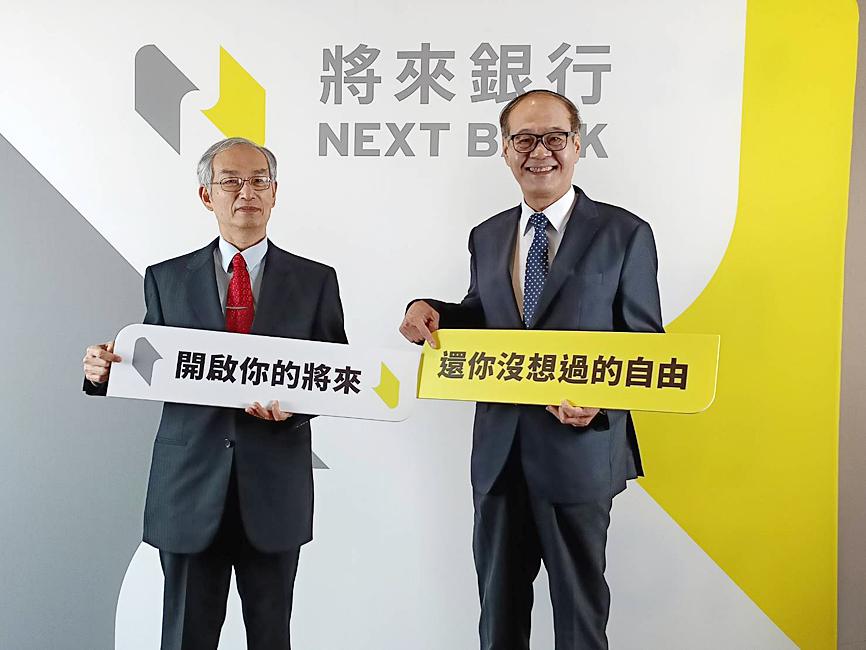Next Commercial Bank Co (將來商業銀行) yesterday said that nearly 60,000 people had opened accounts since it commenced operations at the end of last month, with the average deposit more than NT$70,000 (US$2,374).
The nation’s third Web-only bank had allowed people to choose their own bank account numbers before it launched on March. 29, gaining about 40,000 accounts as of the end of last month, bank data showed.
The momentum continued this month, with people welcoming the new services, it said.

Photo: Lee Ching-hui, Taipei Times
Fifty-three percent of account holders chose their own bank account numbers, while 42 percent used their phone number as their account number, it said.
“It seems that many people prefer to memorize only one set of numbers, so there might be an increase in people using phone numbers as a digital identity number,” Next Bank said.
People in two age groups — 25 to 34 and 35 to 44 — each made up one-third of its account holders, the bank said, adding that about 1,000 people who just turned 20 opened accounts “to embrace their adulthood.”
Accounts are available for people aged 7 to 18, but young people face more restrictions from the Financial Supervisory Commission, including a requirement to submit a parent’s national ID card, Next Bank added.
Some people older than 70 opened accounts, it said.
Its services are widespread and highly competitive, although people in Taipei and nearby urban areas make up 53 percent of its account holders, it said.
The average deposit of NT$70,000 might be because Next Bank’s rewards for new account holders are attractive, it said.
To celebrate a month of operations, Next Bank said it would offer more rewards, including 5 percent of a purchase amount in reward points for account holders who pay with a bank debit card.
For account holders who spend more than NT$1,688 with their debit card, the interest rate on their deposits could be increased to as much as 3 percent for 30 days, it said.
Separately, Taiwan Ratings Corp (中華信評) labeled Next Bank “stable,” with a short-term credit rating of “twA-1” and a long-term rating of “twA+.”

SETBACK: Apple’s India iPhone push has been disrupted after Foxconn recalled hundreds of Chinese engineers, amid Beijing’s attempts to curb tech transfers Apple Inc assembly partner Hon Hai Precision Industry Co (鴻海精密), also known internationally as Foxconn Technology Group (富士康科技集團), has recalled about 300 Chinese engineers from a factory in India, the latest setback for the iPhone maker’s push to rapidly expand in the country. The extraction of Chinese workers from the factory of Yuzhan Technology (India) Private Ltd, a Hon Hai component unit, in southern Tamil Nadu state, is the second such move in a few months. The company has started flying in Taiwanese engineers to replace staff leaving, people familiar with the matter said, asking not to be named, as the

The prices of gasoline and diesel at domestic fuel stations are to rise NT$0.1 and NT$0.4 per liter this week respectively, after international crude oil prices rose last week, CPC Corp, Taiwan (台灣中油) and Formosa Petrochemical Corp (台塑石化) announced yesterday. Effective today, gasoline prices at CPC and Formosa stations are to rise to NT$27.3, NT$28.8 and NT$30.8 per liter for 92, 95 and 98-octane unleaded gasoline respectively, the companies said in separate statements. The price of premium diesel is to rise to NT$26.2 per liter at CPC stations and NT$26 at Formosa pumps, they said. The announcements came after international crude oil prices

SinoPac Financial Holdings Co (永豐金控) is weighing whether to add a life insurance business to its portfolio, but would tread cautiously after completing three acquisitions in quick succession, president Stanley Chu (朱士廷) said yesterday. “We are carefully considering whether life insurance should play a role in SinoPac’s business map,” Chu told reporters ahead of an earnings conference. “Our priority is to ensure the success of the deals we have already made, even though we are tracking some possible targets.” Local media have reported that Mercuries Life Insurance Co (三商美邦人壽), which is seeking buyers amid financial strains, has invited three financial

CAUTION: Right now, artificial intelligence runs on faith, not productivity and eventually, the risk of a bubble will emerge,’ TIER economist Gordon Sun said Taiwanese manufacturers turned more optimistic last month, ending a five-month streak of declining sentiment as concerns over US tariffs, currency volatility and China’s overcapacity began to ease, the Taiwan Institute of Economic Research (TIER) said yesterday. The manufacturing business confidence index rose 1.17 points from June to 86.8, its first rebound since February. TIER economist Gordon Sun (孫明德) attributed the uptick to fading trade uncertainties, a steadier New Taiwan dollar and reduced competitive pressure from Chinese producers. Taiwan’s semiconductor industry is unlikely to face significant damage from Washington’s ongoing probe into semiconductors, given the US’ reliance on Taiwanese chips to power artificial